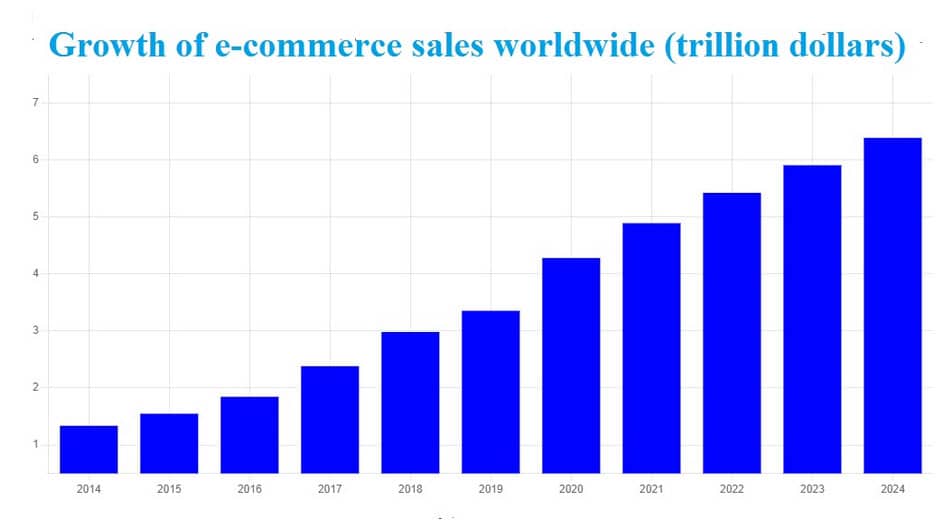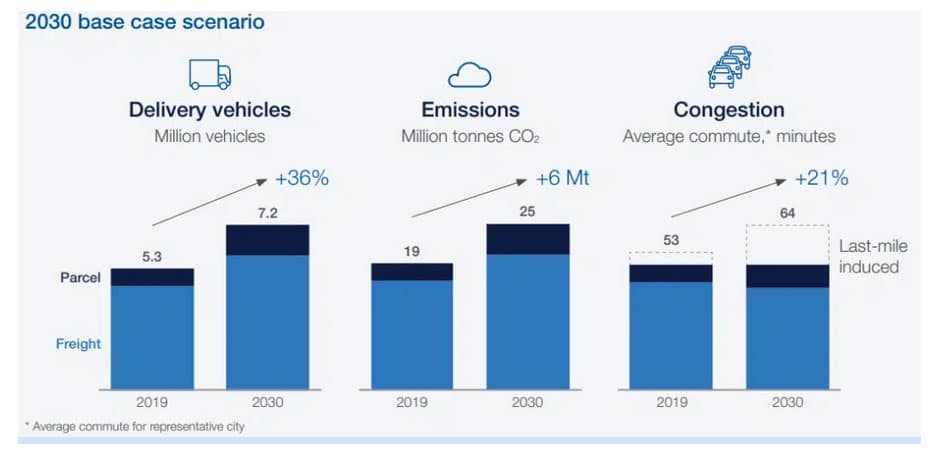The role of technology in creating sustainable practices in online commerce

Annotation: The article explores the importance of using modern information technologies to create sustainable practices in e-commerce. The author focuses on the significant role of modern solutions such as the use of energy-efficient delivery systems, implementation of smart analytical tools to optimize resources and reduce waste. The article provides valuable practical advice and insights for businesses wishing to adopt modern approaches to their operations in an era of rapidly evolving e-commerce.
Relevance of sustainable practices in e-commerce
The modern digital age has brought many benefits to our lives, one of which is the possibility of e-commerce. Every year, more and more people prefer to shop online, which leads to an increase in online sales.

A global trend in recent years in trade has been the focus on sustainable practices. These include efforts to reduce negative environmental impact, efficient use of resources, reduce emissions and pollution, and maintain natural ecosystems. The active use of modern information technologies plays a crucial role in the implementation of such practices, as IT provides companies with tools and resources to optimize processes, reduce costs and reduce waste.
The most effective online trading tools that play an important role in solving environmental and social problems include:
- Improving logistics efficiency
A basic aspect affecting the sustainability of online commerce is logistics. The transportation of goods around the world has been responsible for a huge share of CO2 emissions created by e-commerce. In 2020, product shipment and returns accounted for 37% of total greenhouse gas emissions. By 2030, the number of delivery vehicles is projected to increase by 36% to approximately 7.2 million vehicles.
The automation of logistics processes directly determines the efficiency of freight optimization, which helps reduce time and environmental costs of goods delivery. The use of IT systems for warehouse management, delivery routing and vehicle optimization helps reduce carbon emissions and environmental impact.
- Implementing smart packaging
Technology is also driving the development of smart packaging that can be recycled or reused. By integrating smart labels and sensors into packaging, it is possible to monitor the storage conditions of goods and prevent possible damage. This solution reduces waste and contributes to the sustainability of trade processes. - Improved energy efficiency
Optimizing energy consumption in online commerce is one of the important challenges for implementing sustainable practices. Technology is enabling energy-efficient server centers and data centers, which reduces energy consumption and climate impact. Implementing green data systems and utilizing renewable energy sources help reduce the environmental burden of online commerce. - Promoting sustainable goods
IT is also enabling the active promotion of sustainable goods and services to consumers. Online marketing and social media create opportunities to inform customers about the environmental and social performance of products. This builds consumer demand for sustainable products and encourages businesses to produce and offer more sustainable products. - Implementing smart analytics systems
Analytics and machine learning technologies allow collecting and analyzing huge amounts of data about customer behavior, preferences and needs. This helps businesses to better understand their audience and customize a personalized customer experience. With smart analytics, businesses can offer more relevant products while reducing the risk of returns and increasing customer loyalty. - Developments in virtual and augmented reality
Virtual and augmented reality are becoming increasingly popular tools in e-commerce. They allow customers to ‘try on’ products online, view them in real life and get a better understanding of the products before they buy. This helps reduce the likelihood of returns and improves the customer experience. - Utilizing blockchain technology
Blockchain technologies help improve the transparency and security of shopping processes. They allow the tracking of goods from the manufacturer to the consumer, which helps in the fight against counterfeit products and ensures customer trust. Blockchain can also be used to implement loyalty programs and reward customers for their purchases. - Educating and informing customers
Technology is also helping companies educate customers about the importance of sustainable consumerism and engage them in responsible practices. The creation of online educational resources, campaigns and promotions, and the integration of environmental information on online commerce platforms are helping to increase customer awareness and participation in creating a sustainable economy.
Challenges of implementing sustainable practices in e-commerce
Adopting sustainable practices in e-commerce can face several obstacles that make it difficult to implement them successfully. Here are some of them:
Data security: Increasing sustainability requires collecting and processing a large amount of data, including information about consumers and production processes. This can create data security and safety issues.
Lack of compatibility: Some resilient tehnologies may not be fully compatible with existing systems and platforms, inevitably leading to implementation challenges.
Cost: Certain technologies are categorized as expensive. This is especially hard for SMBs, which can be a barrier to adoption.
Difficulty scaling: A number of sustainable practices demonstrate high efficiency at small scale, but make it difficult to scale to larger production volumes.
Lack of standards: Sustainability and e-commerce lack uniform standards and regulations, making it difficult to select and implement technology solutions.
Despite these challenges, the implementation of sustainable practices in e-commerce remains an important and pressing issue that requires collaborative efforts from companies, governments and consumers to create a more responsible industry.
Conclusion
Technology plays a key role in creating sustainable practices in online commerce by optimizing logistics, developing smart packaging, improving energy efficiency, and promoting eco-friendly products. However, the implementation of eco-responsible operating formats faces technological challenges such as lack of interoperability, data security, high cost, and difficulty in scaling. Addressing these challenges requires the cooperation of all market players, including companies, governments and educational institutions. Engaging customers in conscious consumerism and educating the public about the benefits of sustainable practices also play an important role in shaping green e-commerce. Successful implementation of sustainable practices in online commerce contributes not only to the competitiveness of companies, but also to the preservation of the environment and public well-being.
Sources:
Environmental impact of e-commerce logistics worldwide in 2019 with a forecast for 2030, by indicator, Statista
The Truth About Online Shopping and Its Environmental Impact BY MARTINA IGINI, Earth.Org, DEC 15TH 2022
38 E-Commerce Statistics Of 2023, Forbes Advisor, Feb 8, 2023
2020 Report on the Environmental Impact of E-Commerce, Research and Markets, January 23, 2020
Written by Sergei Khabarov, Top IT manager, and e-commerce expert.
Have you read?
World’s Most Influential and Innovative Companies.
World’s Best Hospitality And Hotel Management Schools.
The world’s top 50 most popular luxury brands for 2023.
Richest Tennis Players In The World.
Richest Actors In The World.
Bring the best of the CEOWORLD magazine's global journalism to audiences in the United States and around the world. - Add CEOWORLD magazine to your Google News feed.
Follow CEOWORLD magazine headlines on: Google News, LinkedIn, Twitter, and Facebook.
Copyright 2025 The CEOWORLD magazine. All rights reserved. This material (and any extract from it) must not be copied, redistributed or placed on any website, without CEOWORLD magazine' prior written consent. For media queries, please contact: info@ceoworld.biz








